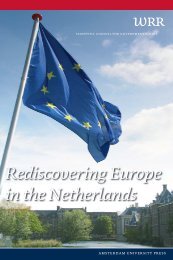The Western Condition - St Antony's College - University of Oxford
The Western Condition - St Antony's College - University of Oxford
The Western Condition - St Antony's College - University of Oxford
You also want an ePaper? Increase the reach of your titles
YUMPU automatically turns print PDFs into web optimized ePapers that Google loves.
An ambivalent decade: Three variations in the AKP’s foreign policy<br />
Perhaps most importantly, during these years the party was also engaged in a relatively pluralistic<br />
process <strong>of</strong> self-critique, which allowed it to produce dynamic and relevant responses to the changing<br />
and at times conflicting demands <strong>of</strong> its various constituencies. This dynamism stood in stark contrast<br />
with the stagnant worldview and insipid politics <strong>of</strong> the AKP’s Kemalist rivals, especially the main<br />
opposition Republican People’s Party (Cumhuriyet Halk Partisi, CHP), whose hierarchical leadership<br />
had still subscribed to a Cold War-era existential threat rhetoric and readily appealed to the<br />
institutional powers <strong>of</strong> the military and the Kemalist judiciary in the face <strong>of</strong> the complex sociopolitical<br />
challenges facing Turkey at the beginning <strong>of</strong> the 21 st century.<br />
This dynamic and reconciliatory approach also characterised the AKP’s foreign policy, which was<br />
steered in these years by Abdullah Gül, a s<strong>of</strong>t spoken and affable politician who as prime minister<br />
(2002 – 2003) and foreign minister (2003 – 2007) worked to strengthen Turkey’s diplomatic ties<br />
with its western and regional counterparts. Like in its domestic politics, the EU and the accession<br />
process featured prominently in Turkey’s foreign politics during this period. In 2004, for example,<br />
in a bold attempt to resolve the frozen conflict in Cyprus, which remains one <strong>of</strong> the key obstacles<br />
to Turkey’s European integration, the AKP government supported the Annan Plan for the<br />
reunification <strong>of</strong> the island, despite stiff resistance from the still influential Kemalist establishment.<br />
When put to referendum the plan was supported by a majority <strong>of</strong> Turkish Cypriots, but rejected by<br />
Greek Cypriots, which led to its failure and the subsequent admission <strong>of</strong> Cyprus into the EU as a<br />
divided nation. <strong>The</strong> EU’s influence over Turkey’s domestic and foreign politics peaked with the<br />
initiation <strong>of</strong> formal membership negotiations in 2005, from which point onwards it has gradually<br />
waned parallel to the slowing momentum <strong>of</strong> the accession process.<br />
<strong>The</strong> AKP government also worked to maintain Turkey’s close strategic ties with Israel and the<br />
United <strong>St</strong>ates, on the basis <strong>of</strong> security cooperation within the framework <strong>of</strong> the Bush<br />
administration’s “global war on terror”. As part <strong>of</strong> this framework, soon after the 11 September<br />
2001 attacks and the US-led occupation <strong>of</strong> Afghanistan, Turkey provided logistical and military<br />
support to Washington. Neo-conservative strategists and think tanks in turn began promoting<br />
Turkey as the ‘moderate’ antidote to Islamic fundamentalism; they were soon joined by a chorus<br />
<strong>of</strong> influential foreign policy pundits within the mainstream US media. 37 <strong>The</strong> idea was <strong>of</strong>ficially<br />
articulated as part <strong>of</strong> the “Broader Middle East and North Africa Initiative”, publicised by the<br />
US government as a project <strong>of</strong> democracy promotion and adopted at the G8 Sea Island summit<br />
37 For example, upon a perfunctory placement <strong>of</strong> the country – and himself – at Samuel Huntington’s civilisational<br />
fault line (“<strong>The</strong>re is nothing like standing at this stunning intersection <strong>of</strong> Europe and Asia to think about the clash<br />
<strong>of</strong> civilizations – and how we might avoid it”), Thomas Friedman <strong>of</strong> the New York Times described Turkey as a “free<br />
society […] which has always embraced religious pluralism” and suggested that the “moderate branch <strong>of</strong> Turkish<br />
Islam” was the “real Islam”. He then went on to argue: “if we want to help moderates win the war <strong>of</strong> ideas within<br />
the Muslim world, we must help strengthen Turkey as a model <strong>of</strong> democracy, modernism, moderation and Islam all<br />
working together.” Thomas Friedman, ‘War <strong>of</strong> Ideas, Part 2’, New York Times, 11 January 2004.<br />
24

















